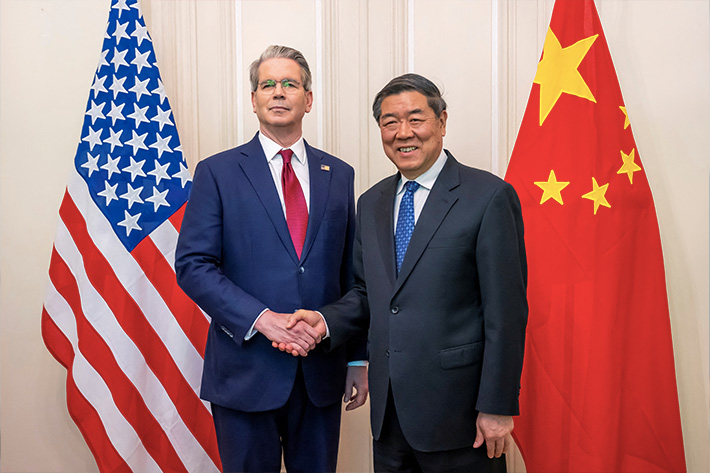US and Chinese officials have agreed to a deal on TikTok, the Chinese social media app, at trade talks in the Spanish capital Madrid on Monday.
Feedback from US officials about a deal fluctuated wildly on Monday, from positive to very negative – with even an alleged threat that it could be shut down on Wednesday, if China didn’t drop its alleged demand that the US must slash its tariffs and end chip restrictions before it agrees to divest TikTok’s operations in the US.
A senior US trade official warned that the ban on the short-video app could go ahead on Wednesday if Beijing didn’t drop such requests and allow it to move to US ownership. Whether this was embellishment, or theatrics, isn’t known.
ALSO SEE: China May be Hit by Malaysia’s Move to Slow Data Centre Growth
Early on Monday, Bessent said while both sides had made good progress on technical details, reaching a deal on other issues would be challenging.
He said the two sides were discussing the divestment of TikTok by Chinese owner Bytedance as part of broader talks of tariffs and economic policy, but indicated there was little progress on that front.
“Our Chinese counterparts have come with a very aggressive ask,” Bessent told reporters alongside Trade Rep Jamieson Greer.
“We will see if we can get there at present. We are not willing to sacrifice national security for a social media app,” he said.
Extending the TikTok divestment deadline would depend largely on how talks went on Monday, he said.
“From the Chinese perspective, they view as part and parcel of the potential TikTok deal a variety of matters, whether it’s tariffs or other measures that have been taken over years,” Greer said.
But the United States was not in a position to simply eliminate every measure it had ever taken to try [to] resolve the issue, he added.
“We still have to grind through negotiations and discussions of the common understanding, and I don’t think this is the moment to just pull all those things.”
Trump reveals ‘happy’ outcome for ‘young people’
But not long after, US President Donald Trump announced the news, with a post on Truth Social that said trade talks with China had gone very well and hinted that a deal had been reached to resolve issues the US has over TikTok’s ownership.
The Republican president said he would be speaking to Chinese President Xi Jinping on Friday.
“The big Trade Meeting in Europe between The United States of America, and China, has gone VERY WELL! It will be concluding shortly,” Trump wrote.
“A deal was also reached on a “certain” company that young people in our Country very much wanted to save. They will be very happy! I will be speaking to President Xi on Friday. The relationship remains a very strong one!!!”
Minutes later, Treasury Secretary Scott Bessent confirmed that the two sides had reached a framework deal on TikTok, but said commercial terms of the agreement could not be released yet.
“We talked about many things we will do in the future,” he said.
Trade Representative Jamieson Greer said the agreement was for US-controlled ownership of TikTok operations in the United States.
China slowdown likely a key factor
China’s Foreign Ministry said both sides were willing to expand bilateral investments, which suggests that the country’s ongoing trade and economic slowdown is likely to have been an important factor in the agreement, as well as Beijing’s desire to get the best possible tariff deal it can from the White House.
Trade negotiators appeared to face a negative backdrop in the lead-up to the latest talks, such as President Trump’s calls for European nations to impose tariffs on China, because of their ongoing purchase of Russian oil.
Bessent said that while tariffs on Russian oil were discussed with He Lifeng and his team, they were not a centrepiece of the talks, which Greer described as ‘productive’.
And Beijing gave little ground in recent days, announcing probes into US tech giant Nvidia, driven by President Xi Jinping’s dislike of restrictions on sales of advanced (and very popular) Nvidia chips.
Bessent felt the announcement, by China’s market regulator, on Monday that a preliminary investigation had found US chip giant Nvidia violated the country’s anti-monopoly law was “poor timing.”
A brief statement from the State Administration for Market Regulation did not elaborate on how the US company, known for its artificial intelligence and gaming chips, might have violated China’s anti-monopoly laws. When the investigation into Nvidia was announced in December it was widely seen as a retaliatory shot against Washington’s curbs on China’s chip sector.
Shots were also fired by the US on Friday, with Washington adding 32 entities – 23 in China – to a commerce department restricted trade list. They included two Chinese firms accused of acquiring US chipmaking equipment for China’s top chipmaker SMIC.
- Jim Pollard with Reuters
ALSO SEE:
White House Opens TikTok Account Amid Push For US Takeover
Trump Will Extend TikTok Ban Deadline Again as Tariffs Stall Deal
Trump Fan May Join Bid For TikTok After White House ‘Invite’
China Bats Away Trump Offer of Tariffs Reduction For TikTok Deal
US Investors in ByteDance ‘Most Likely to Win Control of TikTok’
TikTok to Invest $3.8 Billion in Data Centre in Thailand
Bids Rush in For TikTok as Americans Scramble to Get the App
Bytedance ‘Plans $20 Billion Outlay on AI Infrastructure This Year’
American ‘TikTok Refugees’ Flock to New Chinese Apps
China Cold on Trump’s 50% Ownership Proposal For TikTok
Forced Sale of TikTok is About Security, Not Free Speech, US Says
























